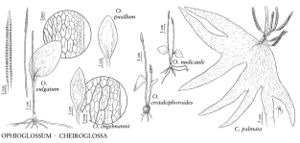Ophioglossum pusillum
Précis Découv. Somiol. 46. 1814.
Roots yellow to tan, to 15 per plant, 0.3-1 mm diam., producing proliferations. Stem upright, to 2 cm, 3mm diam., 1 leaf per stem. Trophophore stalk expanding gradually into blade. Trophophore blade erect or spreading, usually plane when alive, pale green, dull, mostly oblanceolate to obovate to ovate, widest point in middle, to 10 × 3.5 cm, soft, herbaceous, base tapering gradually, apex rounded; venation complex-reticulate, with included free veinlets in areoles. Sporophores arising at ground level, 2.5-4.5 times length of trophophore; sporangial clusters 20-45 × 1-4 mm, with 10-40 pairs of sporangia, apiculum 1-2 mm. 2n =960.
Habitat: Frequent and widespread, open fens, marsh edges, pastures, and grassy shores and roadside ditches, north of the southern boundary of Wisconsin glaciation
Elevation: 100-2000 m
Distribution

B.C., N.B., N.S., Ont., Que., Alaska, Calif., Conn., Idaho, Ill., Ind., Iowa, Ky., Maine, Md., Mass., Mich., Minn., Mont., Nebr., N.H., N.J., N.Y., N.Dak., Ohio, Oreg., Pa., R.I., S.Dak., Vt., Va., Wash., W.Va., Wis.
Discussion
Ophioglossum pusillum is inconspicuous and may be much more common than collections indicate. It differs from O. vulgatum in having an ephemeral, membranous basal sheath.
Selected References
None.
